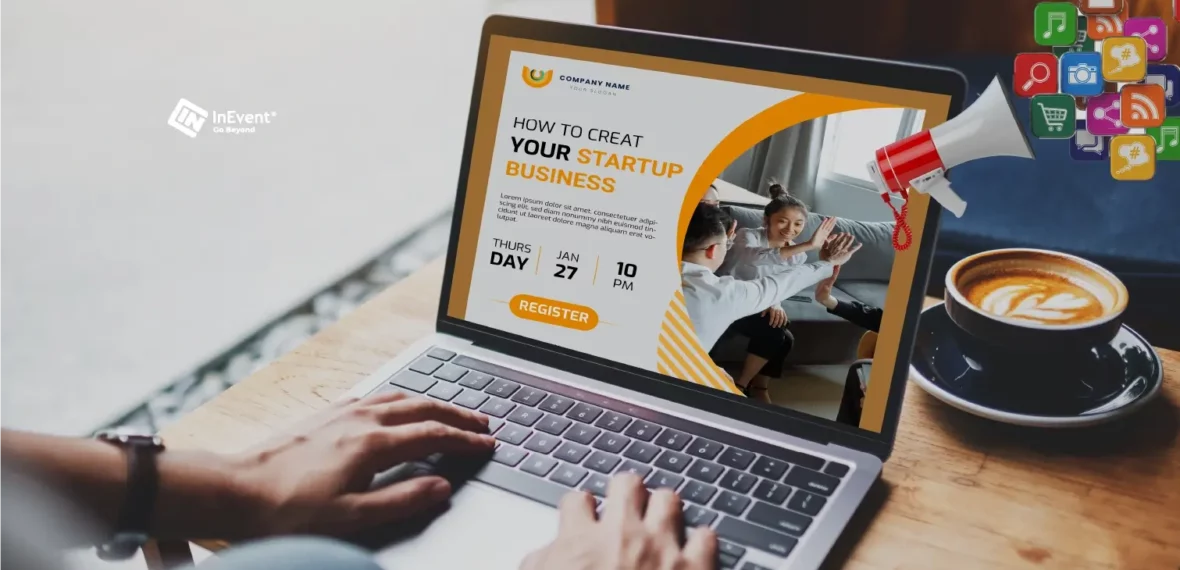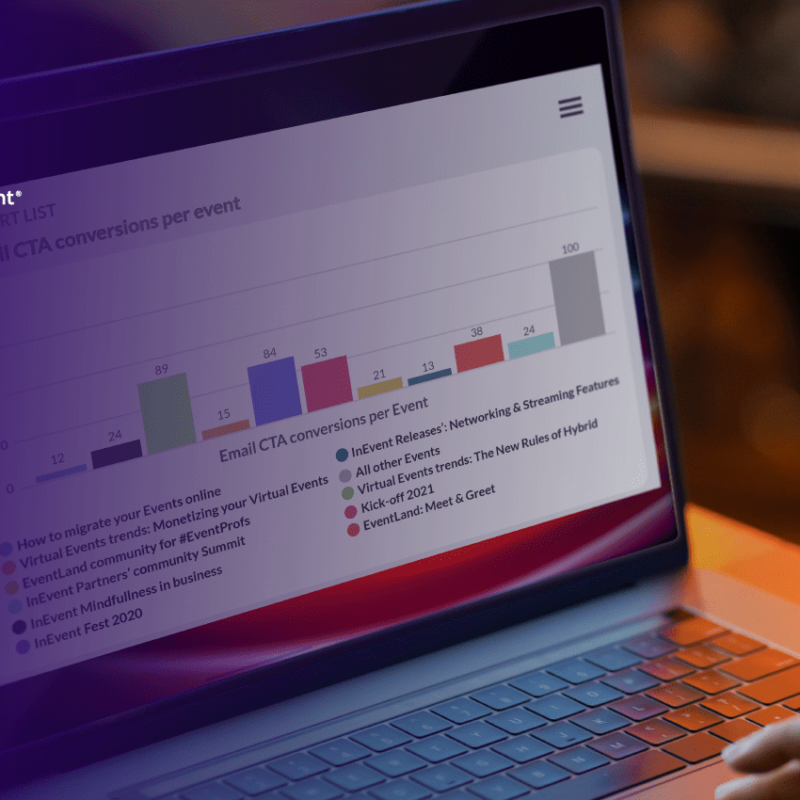Posted on December 4, 2023
Figuring out how to promote an event online effectively can be the difference between its success and failure. Whether it’s an online webinar, a product launch, or a virtual happy hour, advertising your event can make a significant difference. Established brands might find it easier to attract attention, but if you’re just starting out or looking to expand your reach, you’ll need to use all the best strategies available to get all the attention that your event needs.
This guide covers 9 effective ways to promote your event online, helping you drive meaningful engagement and increase attendance. With these tips, you’ll be well-equipped to capture your audience’s attention and make your event successful.
Why Should You Promote Your Event Online?
Online event promotion is crucial for reaching a wider audience and ensuring higher attendance rates. With the increasing reliance on digital platforms, promoting your event online allows you to connect with potential attendees more efficiently and cost-effectively. Whether you’re hosting a small webinar or a large-scale conference, the internet offers a wealth of opportunities to reach and engage with your target audience.
Here are a few key reasons why online promotion is a must for any event:
- Wider Reach: The internet allows you to reach a global audience. Unlike traditional marketing methods, which may be limited to local or regional reach, online promotion can attract attendees from all over the world. This is especially important if your event has the potential to draw interest beyond your immediate area.
- Cost-Effective: Online promotion can be much more cost-effective compared to traditional advertising methods. Social media platforms, email marketing, and content marketing are often less expensive and can offer a higher return on investment. You can also track your spending and adjust your strategies in real-time, ensuring that your budget is used efficiently.
- Targeted Marketing: With online promotion, you can target specific demographics, interests, and behaviors. This means you can tailor your marketing efforts to reach those most likely to be interested in your event. Platforms like Facebook and Google Ads allow you to create highly targeted campaigns that can reach your ideal audience with precision.
- Engagement and Interaction: Online platforms provide numerous ways to engage with your audience before, during, and after your event. Social media, live streaming, and interactive content can create a buzz around your event and keep your audience engaged. This interaction can build a sense of community and increase attendee loyalty.
- Measurable Results: One of the biggest advantages of online promotion is the ability to measure your results. Analytics tools can track the performance of your campaigns in real-time, providing insights into what’s working and what’s not. This data allows you to make informed decisions and optimize your strategies for better results.
- Convenience and Flexibility: Online promotion is incredibly convenient. You can manage and adjust your marketing campaigns from anywhere, at any time. This flexibility allows you to respond quickly to changing circumstances and take advantage of new opportunities as they arise.
In summary, promoting your event online offers numerous benefits, from reaching a wider audience and saving costs to engaging your attendees and measuring your success. By taking advantage of the power of the internet, you can ensure your event gets the attention it deserves and creates a lasting impact.
Best Ways to Promote Your Event Online
1. Leverage Social Media
-
Utilize Different Platforms
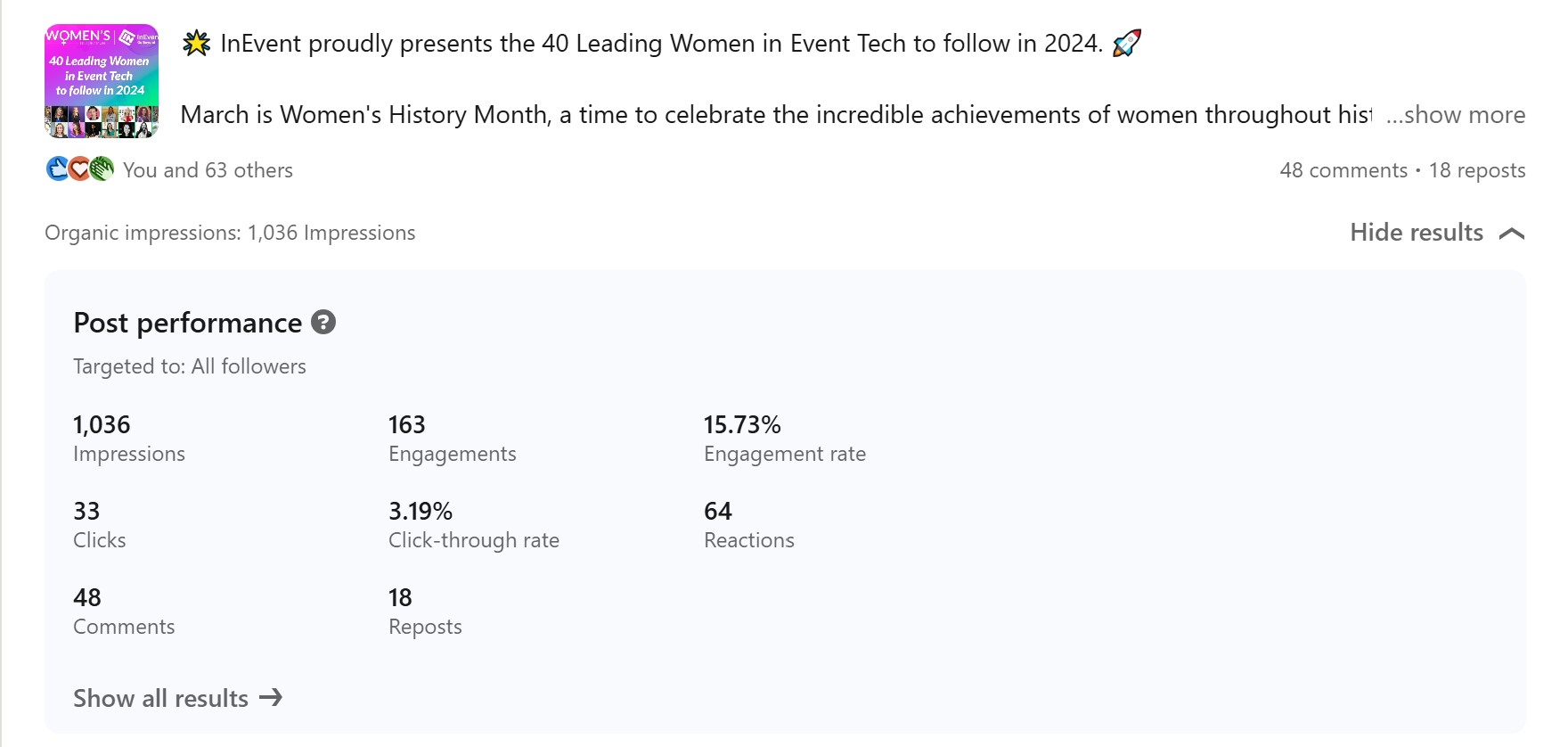
When you’re looking for how to promote an event online, it’s crucial to not limit yourself to just the big players like Facebook (with over 2.9 billion monthly acitve users), Instagram, and Twitter. Consider expanding your horizons to other platforms where your target audience might be active.
An excellent example is this International Women’s month campaign done by InEvent, using the LinkedIn Platform. This post achieved an impressive 15.73% engagement rate compared to the average engagement rate of 2% for the regular LinkedIn post.
Platforms like LinkedIn are fantastic for professional and industry-specific events, while Pinterest and Tumblr can be great for visual and creative gatherings. Each platform offers unique tools and reaches different segments of the social media landscape, boosting your event’s visibility across a broader audience.
-
Encourage User-Generated Content
User-generated content (UGC) is a goldmine for online event promotion. Encourage your attendees to share their experiences online by creating a unique and memorable hashtag for your event. Engage with them by liking, commenting, and sharing their posts. This boosts your content’s reach and builds a community around your event. Consider setting up photo opportunities or backdrops that align with your event theme to make sharing even more appealing. Live streaming parts of the event can also generate buzz and a sense of FOMO for those who aren’t there.
-
Create Shareable Graphics and Videos
Stunning visuals are a great way to generate interest in your event. Invest in creating high-quality, captivating graphics and videos that grab attention and are easy to share. These could include sneak peeks of the event, highlights from previous events, or fun memes related to your theme. Tools like Canva can help you design eye-catching visuals that resonate with your audience and reflect your brand’s identity. Remember, the more shareable your content, the wider it spreads, increasing your event’s reach and potential attendee list.
2. Create Engaging Content
-
Blog Posts and Articles
When crafting blog posts to promote your event, focus on creating content that resonates with your audience. Use bullet lists to break down key points, making them easy to digest. Start each bullet with an action verb to grab your readers’ attention. Incorporate compelling case studies that showcase past event successes, providing tangible examples of what attendees can expect. Remember, the goal is to weave a narrative that informs, entertains, and persuades your audience to register.
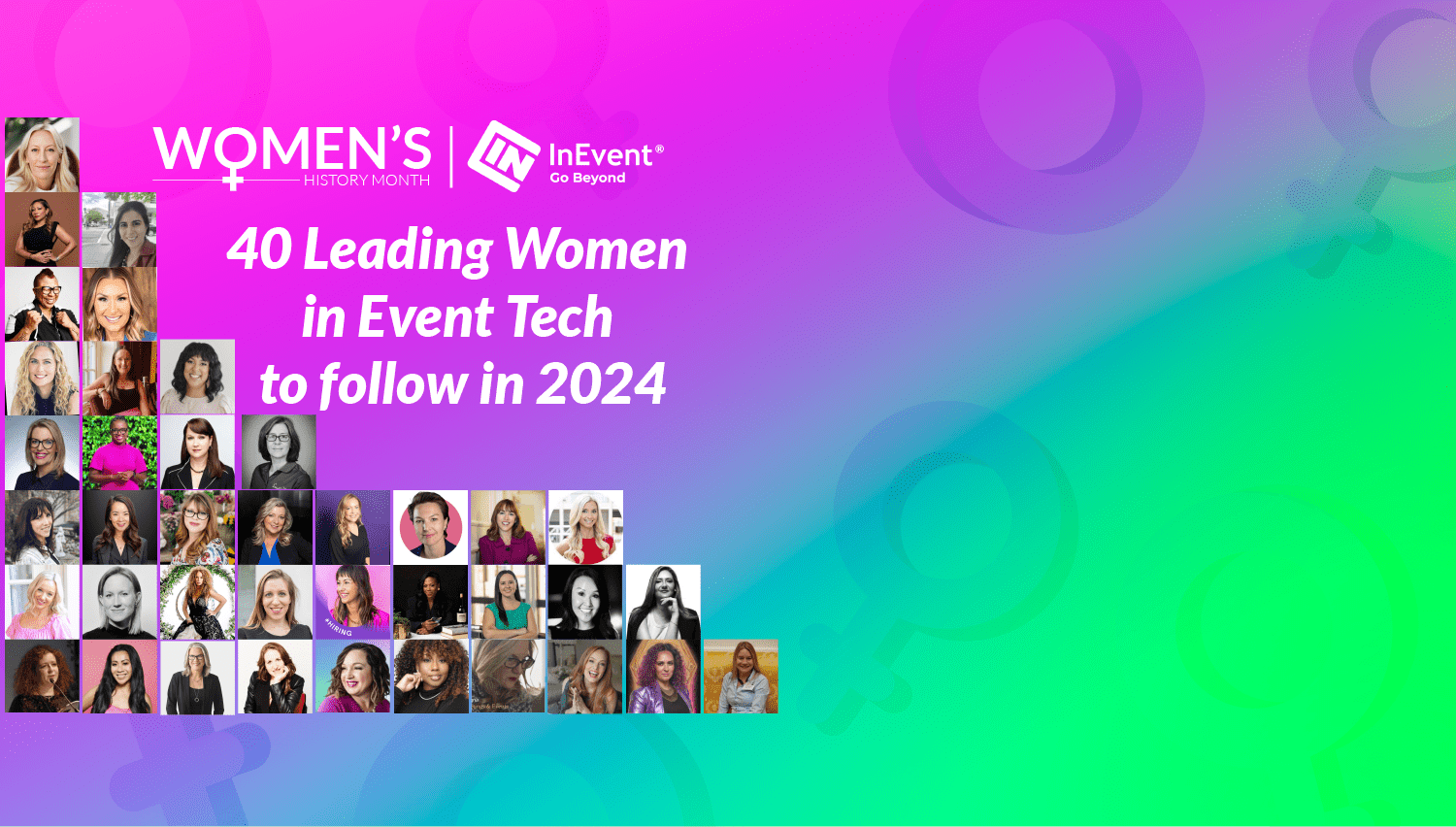
One exemplary blog post campaign is InEvent’s “40 Leading Women in Event Industry” published during Women’s History Month. This campaign focused on celebrating influential women in the event industry, providing readers with inspiring stories and actionable insights. By highlighting industry leaders and their achievements, the blog post attracted significant attention, leading to increased engagement and shares across social media platforms. This success was driven by the post’s relevance, the engaging narrative, and the strong community focus, demonstrating the power of well-crafted content in promoting events and fostering industry connections.
For anyone looking for the best place to promote an event online, this campaign provides a clear example of how thoughtful content can drive significant visibility and engagement.
-
Video Teasers and Highlights
Creating an attention-grabbing event teaser video can significantly increase your promotional efforts. Here’s how to make your video compelling:
- First Impressions Matter: Grab attention in the first few seconds with a powerful opening scene. It can be a hook in the form of a question or an unknown statistical fact.
- Content is King: Ensure the content of your video is engaging and informative. Highlight the unique aspects of your event, like key speakers or exclusive sessions, without giving too much away.
- Visual Appeal: Use high-quality graphics and animations to create a visually appealing experience. This will help your video stand out and encourage shares.
- Call to Action: End your video with a clear call to action. Tell your audience exactly what you want them to do next – whether it’s registering for the event, visiting your website, or sharing the video with friends.
-
Live Streaming Events
Live streaming is another effective strategy, especially when you identify the best place to promote an event online for your target audience. Leverage the power of live streaming to reach a broader audience. Platforms like InEvent allow you to live-stream your events or present a pre-recorded video format on platforms like YouTube or Facebook to broaden your reach and increase engagment. It also offers tools that enhance viewer interaction, such as live polls, Q&A sessions, and real-time comments. Remember to choose a platform that allows customization and integration with your existing systems to maintain a consistent brand experience.
By integrating these strategies into your content creation efforts, you’ll inform potential attendees about your event, excite and engage them, and increase the likelihood of their participation.
3. Utilize Email Marketing
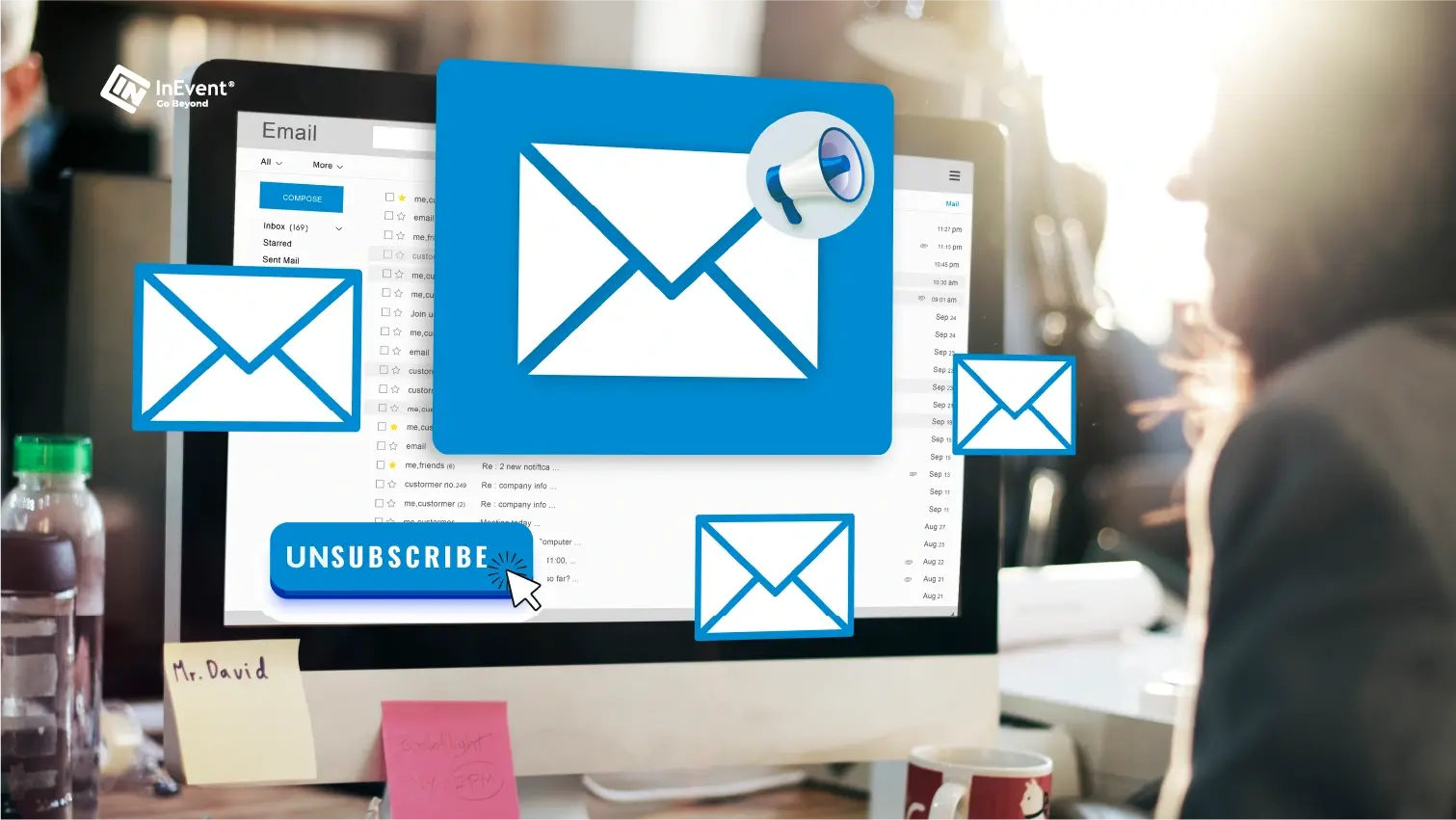
Email marketing holds the golden ticket to promoting your event online, with 78% of event professionals hailing it as their most effective marketing tactic in a study by Eventbrite. But combining it with other strategies can ensure you are utilizing the best place to promote an event online and maximize your reach. Nearly half of your event ticket sales could spring from well-crafted emails. Now, that’s a channel worth mastering. Let’s look into how you can make your email marketing campaign good and spectacular.
-
Segmentation and Targeting
First off, you have to know who you’re talking to. Segmenting your email list into specific groups ensures your message hits home. For instance, if your event is a tech expo, you don’t want to send the same email to software developers as you would to tech enthusiasts. By tailoring your messages, you’re not just shooting arrows in the dark; you’re a marksman hitting the bullseye. Personalization ramps up open rates by up to 50%. So, go ahead, drop their name in the subject line, or craft messages that resonate with their specific interests. It’s like receiving an invite from a friend, and who can resist that?
-
Effective Subject Lines

Now, let’s talk about making an entrance with your subject lines. They’re your first impression, the key to the kingdom, and you should to make it count. A whopping 69% of email recipients report emails as spam based on the subject line alone. So, how do you craft one that beckons to your reader? Keep it short and sweet, for starters.
Subject lines with 6 to 10 words rack up the highest open rates. Leverage the power of FOMO, sprinkle in some numbers or an emoji, but remember, one emoji is plenty. Want to see a 15% increase in clicks? Numbers are your friend. And remember, the goal is to entice, not overwhelm.
-
Follow-up Emails
The event’s over, but your email journey isn’t. This is your chance to transform attendees into loyal fans. A timely follow-up email can work wonders. It’s like catching up over coffee, reflecting on your great time, and hinting at future rendezvous. Keep it personal, express your gratitude, and don’t forget to slip in a clear call to action. You may want their feedback, or you’re inviting them to a future event. Whatever it is, make it irresistible. And remember, this email is an extension of your brand. Let your brand’s personality shine through, making each word count.
Ultimately, email marketing for event promotion is an art and a science. By segmenting your audience, crafting killer subject lines, and mastering the follow-up, you’re not just promoting an event but building a community. And isn’t that what it’s all about?
4. Collaborate with Influencers
-
Identify Relevant Influencers
When aiming to promote your event, it’s crucial to collaborate with influencers who resonate with your brand and reach your target audience. Start by analyzing influencers who are recognized experts in your industry or those who align with the niche of your event. This ensures their followers are likely your potential attendees. Look into their social media presence, examining the engagement levels, such as comments and likes, to gauge how actively their audience interacts with their content. Remember, it’s not just about the number of followers; the quality of engagement and the influencer’s credibility are what truly count.
-
Create Partnerships for Promotion
Once you’ve identified the right influencers, the next step is to craft compelling partnerships that benefit both your event and the influencers. Approach them with clear, mutually beneficial agreements that outline what is expected from both sides. These partnerships should focus on promoting the event and creating an authentic connection between the influencer and your brand. Whether through sharing unique content like behind-the-scenes looks or offering exclusive insights into the event, these collaborations should feel genuine and engaging to the audience.
-
Monitor and Measure the Impact
To truly understand the effectiveness of your influencer collaborations, tracking and measuring their impact is essential. Implement tools and methods such as unique promo codes, referral links, and direct tracking of engagement metrics like clicks, likes, and shares. This data shows the immediate effects of the influencer’s promotions and helps make informed decisions for future marketing strategies. Analyzing these metrics will allow you to see which influencers drive the most interest and conversions for your event, enabling you to optimize your approach in real time and for future events.
5. Employ Paid Advertising
-
Use Targeted Ads
To effectively promote your event online, leveraging targeted ads is a game-changer. Platforms like Google Ads and Facebook Ads offer robust targeting options that enable you to pinpoint your ideal audience based on demographics, interests, and behaviors. For instance, if you’re hosting a tech conference, you can target tech enthusiasts and professionals who will most likely be interested in your event. This precision not only boosts the relevance of your ads but also enhances the efficiency of your advertising spend making it a key component of online event promotion
-
Explore Different Ad Formats
Diversity in ad formats can significantly impact the success of your promotional efforts. Consider using a mix of video ads, carousel ads, and display ads to keep your audience engaged. Each format serves a unique purpose:
- Video Ads: These are perfect for storytelling or showing highlights from past events, making your current event irresistible.
- Carousel Ads: Use these to feature different speakers or event highlights, providing a dynamic visual experience.
- Display Ads: Effective for retargeting, these ads can remind users to complete their registration or inform them about event updates.
Using these varied formats helps cater to different preferences within your target audience, ensuring your message is seen and resonates.
-
Track Ad Performance
Measuring the success of your advertising efforts is crucial. Utilize analytics tools advertising platforms provide to track metrics like impressions, clicks, and conversions. This data lets you see which ads are performing well and which aren’t, enabling you to make informed decisions about budget allocation and ad optimization. For deeper insights, consider setting up A/B testing for different ad versions to determine which elements work best for your audience.
By combining targeted advertising strategies with diverse ad formats and rigorous performance tracking, you’re setting the stage for a highly successful online event promotion. Remember, the key is to keep adapting and optimizing based on the data you gather. This way, you ensure that every dollar spent on advertising is an investment towards the success of your event.
6. Optimize Your Event Website
-
SEO Best Practices
Optimizing your event website for search engines is crucial to ensure it reaches the broadest possible audience. Start by incorporating your target keywords naturally throughout your content and metadata, including title tags, meta descriptions, and headings. Remember, a well-optimized website isn’t just about attracting visitors—it’s about providing a seamless experience that meets their needs and encourages them to register for your event. Use modern SEO strategies such as adding structured data (event schema) to help search engines understand the context of your pages, enhancing visibility in search results.
-
Clear Call-to-Actions
A powerful call-to-action (CTA) can transform your event website from informative to compelling. Ensure that your CTAs are visually distinct and placed strategically across your website, encouraging visitors to take action, whether registering, downloading a brochure, or contacting for more information.

Use action-oriented language that creates a sense of urgency, like “Register Now to Secure Your Spot!” or “Download the Agenda Today!” This clarity and emphasis on action can significantly increase conversion rates.

User-Friendly Layout
Your event website should be a beacon of simplicity and functionality. Opt for a visually appealing layout that is easy to navigate, avoiding clutter that can detract from the user experience. Essential information about the event should be front and center, making it easy for potential attendees to find what they need and take action. Ensure your website design is responsive and looks and works well on devices of all sizes. A mobile-friendly website caters to a larger audience and improves SEO performance.
By focusing on these elements, you’ll create an event website that draws visitors in and effectively engages and converts them. Remember, your website is often the first point of contact for potential attendees, so make every second on the site count.
7. Engage with Online Communities
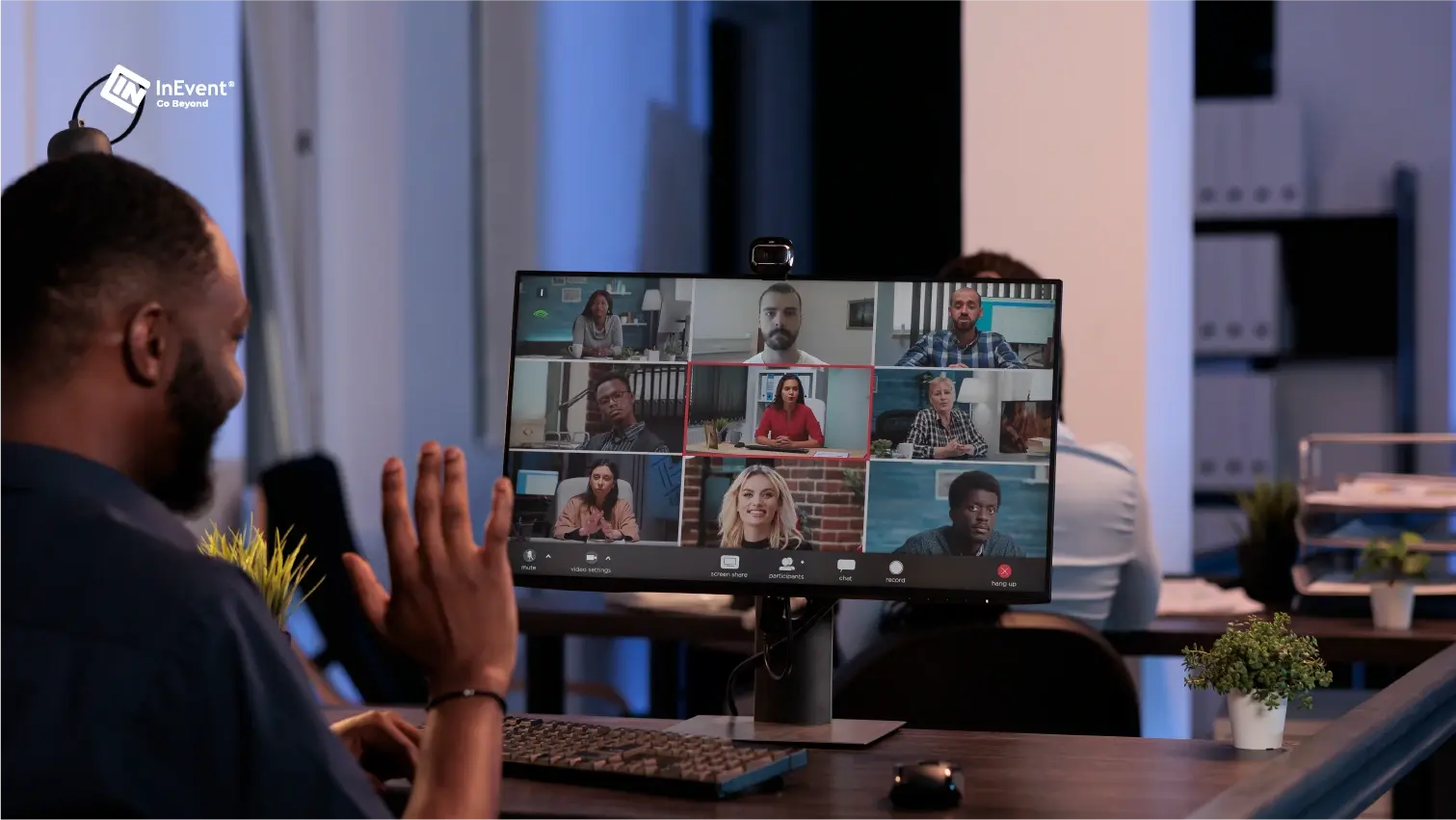
-
Join Industry Forums and Groups
To effectively promote your event online, consider diving into forums and groups that cater to your target audience. Platforms like LinkedIn and Reddit are teeming with specialized groups where professionals discuss industry-specific topics. Here’s how you can make the most of these platforms:
- Identify Relevant Communities: Search for groups that align with your event’s theme or industry. For instance, if you’re hosting a tech conference, join groups related to technology and innovation.
- Read and Respect the Guidelines: Each community has its own set of rules. Ensure you understand and adhere to these to avoid being seen as spammy.
- Engage Genuinely: Don’t just post about your event. Participate in discussions, answer questions, and share relevant information to build trust and establish your credibility.
-
Share Valuable Content
Your engagement should always add value to the conversation. Here’s what you can do:
-
- Create and Share Insightful Posts: Share articles, blogs, or videos that provide insights relevant to the group’s interests. This could be tips, industry news, or innovative ideas.
- Use Visuals and Videos: Visual content, like infographics or short videos, can be more engaging and shareable. Remember, platforms like Facebook favor video content, which tends to have higher engagement rates.
- Highlight User-Generated Content: Encourage your community members to share their stories or experiences about your event’s theme. This enriches the community content and builds a more personal connection with your event.
-
Participate in Discussions
Active participation is vital to keeping your community engaged. Here’s how you can immerse yourself in meaningful interactions:
- Respond to Comments and Questions: Show that you value the community’s input by responding promptly to their inquiries and comments.
- Host Q&A Sessions: Set up regular Q&A sessions about your event or related topics to stir interest and provide direct engagement with potential attendees.
- Offer Exclusive Insights: Share exclusive content or behind-the-scenes looks at your event preparations to spark interest and anticipation.
Following these strategies will enhance your event’s visibility and build lasting relationships with community members, turning them into potential attendees and promoters. Engaging with online communities fosters a sense of belonging and excitement, ensuring that your event becomes a topic of discussion and anticipation long before it begins.
8. Offer Incentives for Early Sign-Ups
-
Exclusive Discounts
Offering discounted “early bird” pricing is a classic yet highly effective way to encourage early registrations. However, balancing your budget by limiting the number of discounted passes is essential. For instance, you might offer the first 100 registrants a significant discount, which drives quick sign-ups and helps manage your revenue expectations effectively.
-
Special Offers and Freebies
Beyond price reductions, consider adding value through unique offers. Early registrants could receive exclusive access to additional events, like a VIP evening or a special networking session, which are unavailable for later sign-ups. For example, providing the first 50 registrants complimentary tickets to an exclusive post-event gathering can create a compelling reason for early commitment. Additionally, consider partnering with influencers to amplify the reach and attractiveness of these offers.
-
Early Bird Packages
Creating tiered early bird incentives can further enhance the attractiveness of signing up early. Start by offering the deepest discounts or exclusive access to the earliest registrants. As the event approaches, you can gradually reduce the discount amount and the exclusivity of the offers. This tiered approach not only maintains a sense of urgency but also rewards the most eager attendees, fostering a sense of loyalty and excitement around your event.
By strategically implementing these incentives, you can boost early registrations and build anticipation and commitment to your event, ensuring a higher turnout and a more engaged audience.
9. Analyze and Adapt Your Strategy
-
Monitor Analytics and Metrics
Monitoring various analytics and metrics closely is very important to understand how your event performed truly. You can use virtual event platforms that provide detailed dashboards to slice and analyze data effectively. Focus on key metrics such as session attendance, dwell time, and engagement levels to gauge which aspects of your event captured the most interest. This visibility into attendee behavior is invaluable, offering multiple avenues for measuring success and strategically using events as part of your broader marketing strategy.
-
Collect Feedback
Feedback is the cornerstone of event improvement. Implement a variety of methods to collect it effectively:
- Instant Feedback Stations: Place interactive stations at strategic points, like exits or key activity areas, where attendees can quickly provide their impressions.
- Live Polling: Utilize live polling during sessions to gather real-time insights about attendee preferences and satisfaction levels.
- Post-Event Surveys: Send out concise surveys post-event to capture detailed feedback. Keep these surveys short, ideally less than ten questions, and include open-ended questions to allow attendees to expand their thoughts.
Combining immediate feedback with detailed post-event insights lets you capture a comprehensive view of attendee experiences.
-
Make Data-Driven Adjustments
Armed with data, you can make informed decisions to refine future events. Here’s how you can apply your findings:
- Refine Content and Format: Analyze the most popular sessions and consider focusing on similar topics or formats in future events. If specific presentations or styles resonated more with your audience, integrate these elements more prominently.
- Adjust Event Timing and Layout: Data on entry and exit times, along with session popularity, can help you optimize the schedule and layout of your next event to better cater to attendee preferences.
- Enhance Marketing Strategies: Use insights from past marketing campaigns to identify the most effective channels and messaging. Implement A/B testing with promotional messages to refine your approach continually.
By continuously analyzing and adapting based on concrete data, you ensure each event is more aligned with attendee expectations and preferences, enhancing overall satisfaction and engagement.
Conclusion
Promoting your event doesn’t have to be such a daunting task. By understanding the best place to promote an event online and combining various strategies—from the vibrant world of social media to the personalized touch of email marketing—you can create buzzworthy events that attract attendees and build communities. it’s an adventure waiting to happen. It is important to know that the goal is not just to fill seats but to create experiences that linger long after the event concludes.
What works today may need tweaking tomorrow. Keep your strategy ever-evolving, your content fresh, and your audience engagement genuine. Use analytics to fine-tune your approach, and never underestimate the power of blending traditional marketing wisdom with the latest digital trends. The online world is your oyster, and with these strategies in your arsenal, your event is poised to succeed. Here’s to creating buzzworthy events that attract attendees and build communities.
